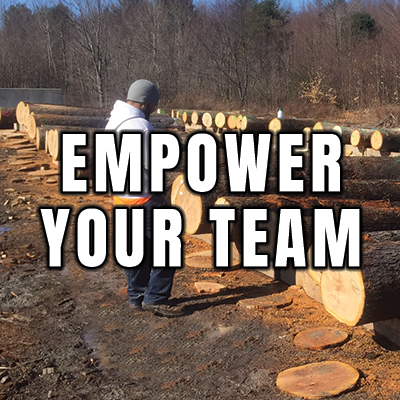 It’s becoming increasingly clear among business leaders that empowered employees are more loyal and productive. We find that when we successfully empower our employees, across all positions, (foresters, sawmill managers, lumber sales, etc.), we receive additional team benefits such as:
It’s becoming increasingly clear among business leaders that empowered employees are more loyal and productive. We find that when we successfully empower our employees, across all positions, (foresters, sawmill managers, lumber sales, etc.), we receive additional team benefits such as:
- Trust and confidence in the company’s leadership team
- Stronger motivation to tackle key challenges within the organization
- Enhanced innovation and creativity among team members
- Higher rates of employee retention
We believe this is important because business leaders and their executive team can’t do everything themselves. “Your staff members have their own talents,” notes Business News Daily, “so you must be humble enough to see and admit that someone else might be a better fit for a task than you are.”
So, if empowering your employees more is of interest to you, perhaps these few tips we have found helpful in the past will kick start your efforts!
Listen more closely. As we’ve noted before, businesses thrive when leaders take time to listen to what employees have to say. Ask these questions whenever possible: Could there be unmet customer needs that should be addressed? Can we identify a more profitable approach to operations? Your talented, frontline employees may have insightful answers to questions like these.
Delegate more. Business leaders understand that delegation is a good thing, but sometimes find themselves reluctant to move ahead in this area. Yet the most effective leaders move beyond this reluctance and delegate more often to employees.
Start with your promising employees. Pinpoint those individuals who appear to deserve more decision-making responsibilities. As time passes, notes the Harvard Business Review, this approach will “give people an opportunity to develop and harness their (often greater) insight into the product, service, or market in question.”
Establish clear-cut expectations. Empowerment works best when team members understand what’s expected of them. Rather than just handing out assignments willy-nilly, take time to “clarify what a successful completion of the task would look like by identifying the end result and the timeframe in which it needs to be completed,” says Forbes.
When employees fully grasp what’s expected of them, there’s a greater likelihood of success —followed in turn by a heightened sense of empowerment among team members.
Give employees access to key resources. It’s one thing to say you want to empower your employees, but if they lack the necessary tools, technology, and related resources, how far can they go? The full weight of a company’s operational resources should be made available to individual or teams, so they can assume autonomy for a project or initiative and have the tools to achieve their (and the company’s) objectives.
Give feedback. The success of empowerment depends upon you and your managers providing constructive feedback on their team’s efforts. Saying, “Great job!” after a task is completed doesn’t really generate much incentive to keep moving forward. Rather, offer precise feedback concerning actions the team took and/or its process for coming up with solutions, so that everyone comes away with “lessons learned” for next time. You’ll likely find steady improvement when this type of feedback is given.
We have found value in intentionally trying to empower employees more. Regardless if that is in the hardwood log yard, the air dried yard, the kiln drying process, or any other aspect of the hardwood lumber business, empower employees boost morale, motivate others and take on more responsibility.
Tony C.
The Baillie Group

